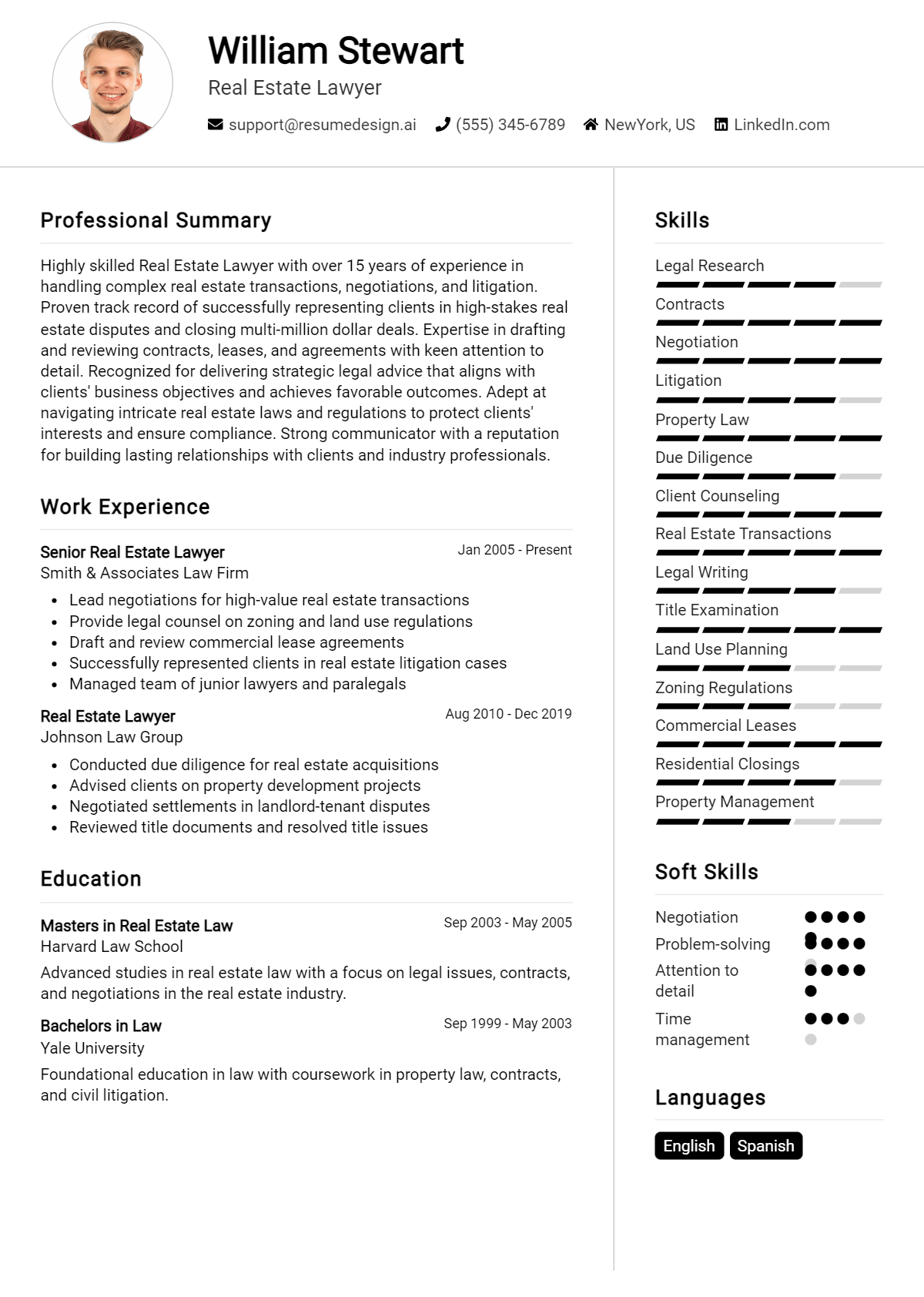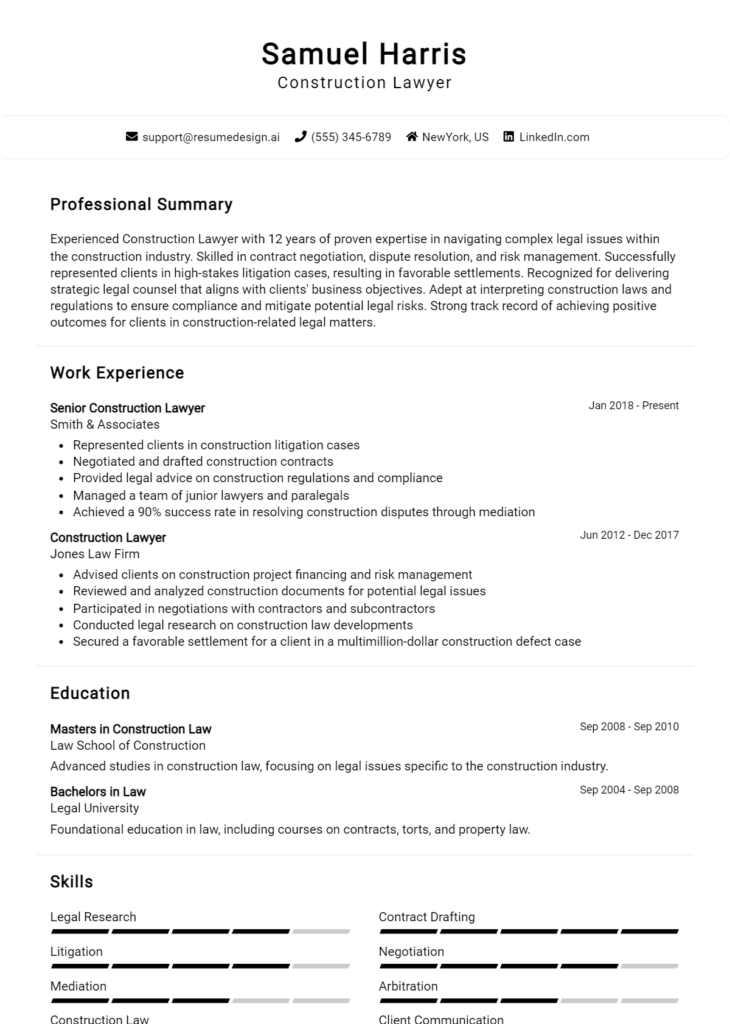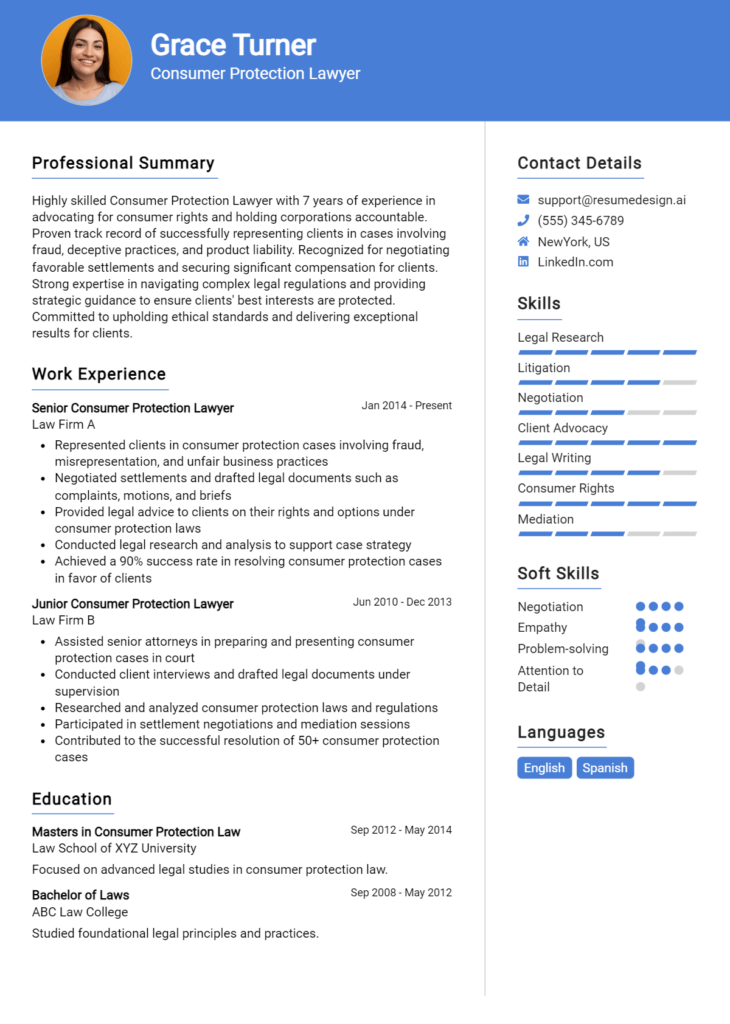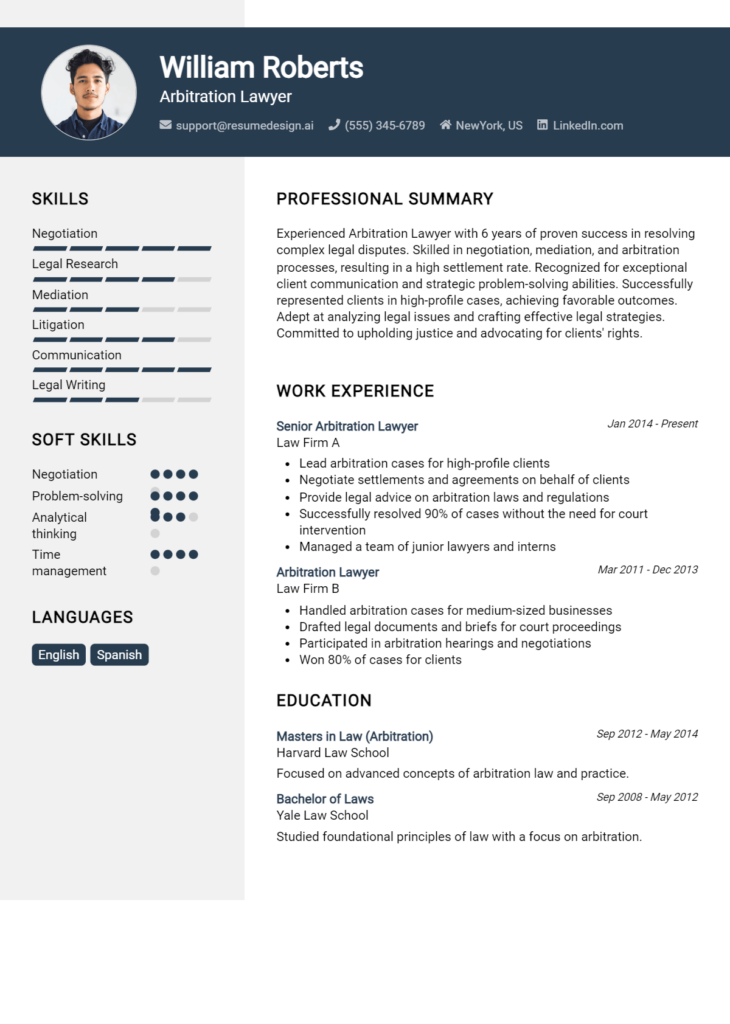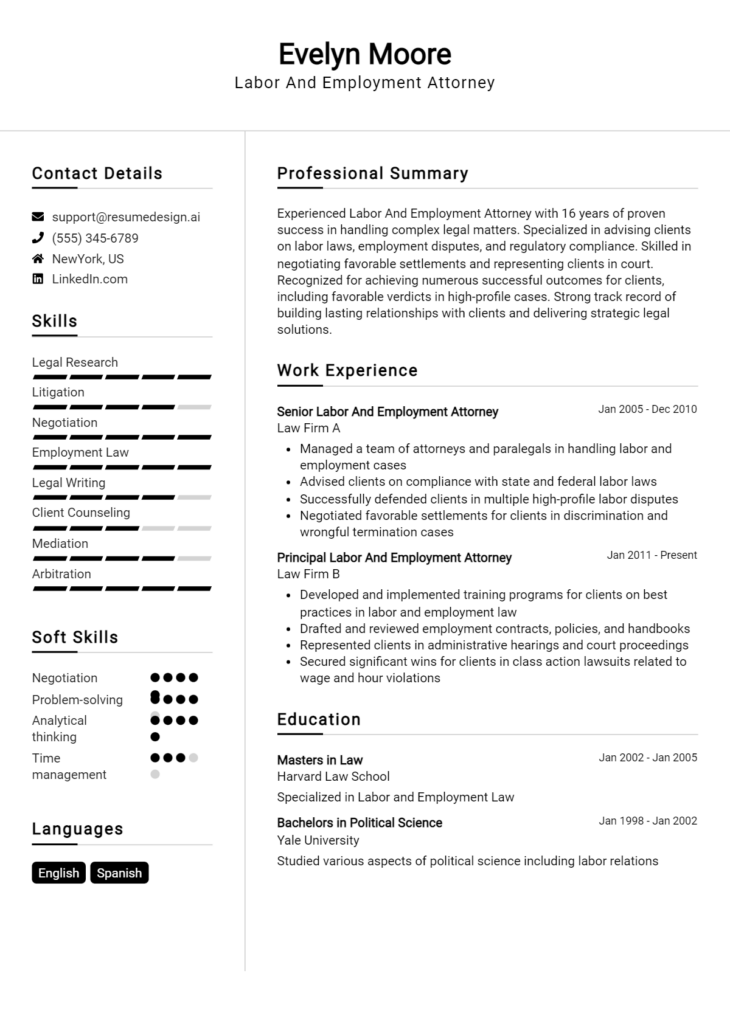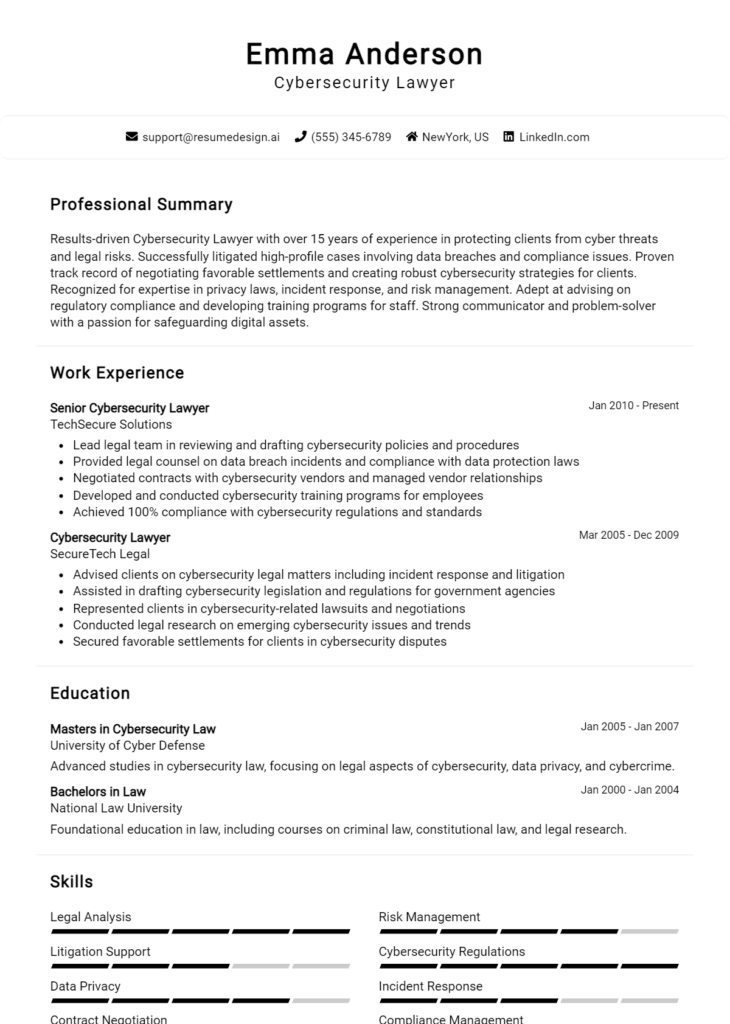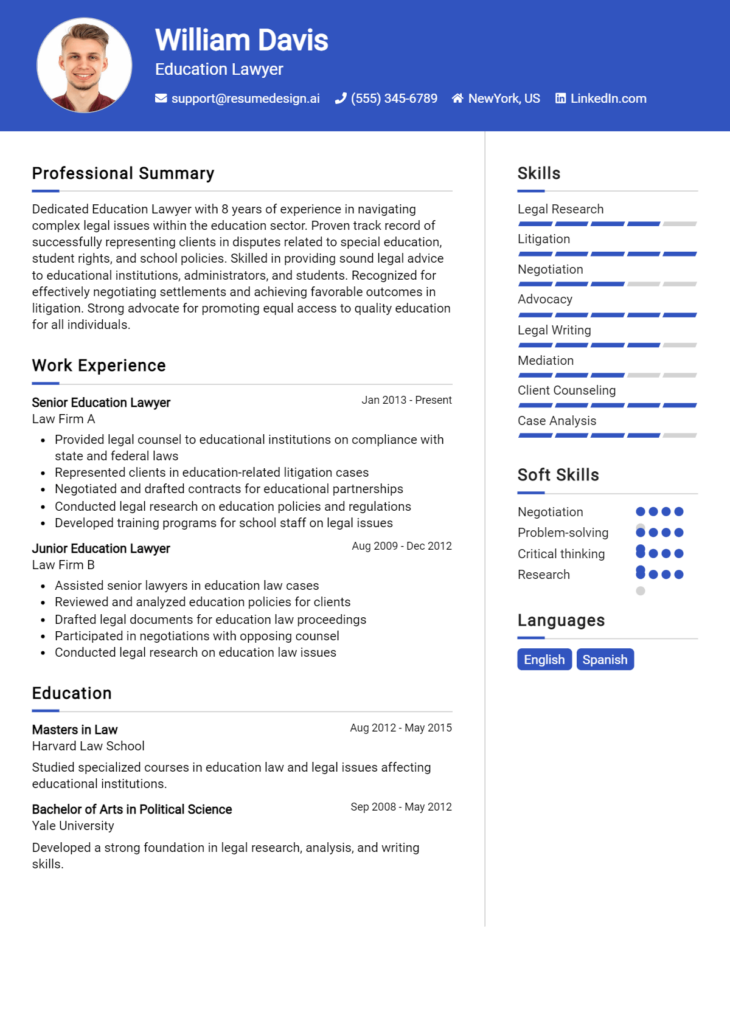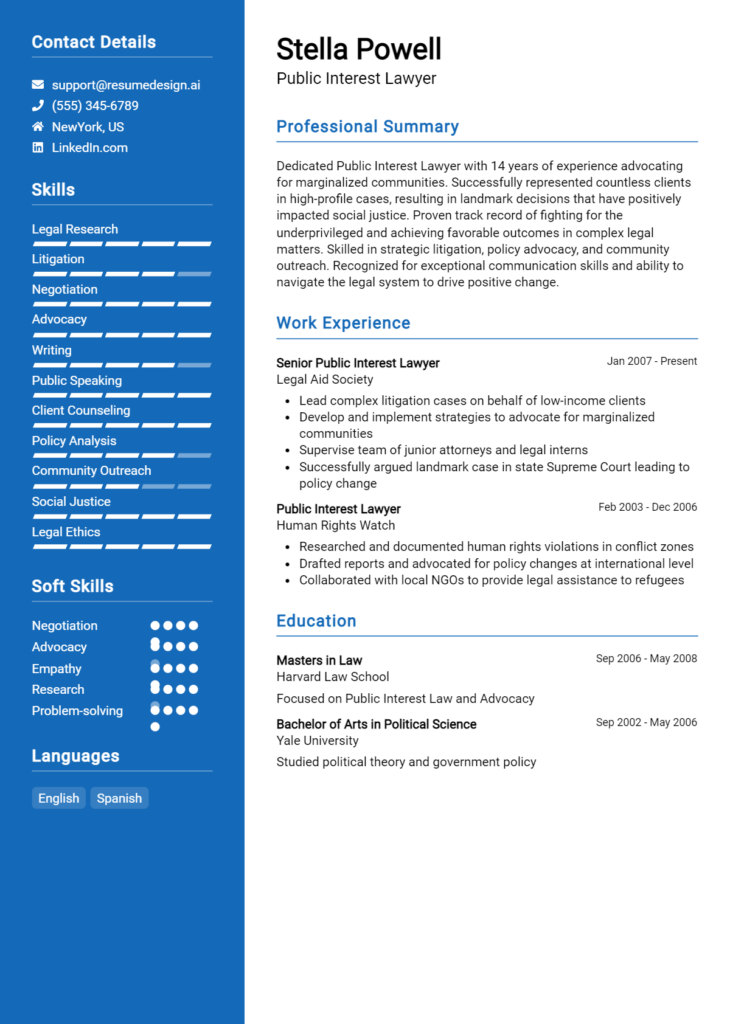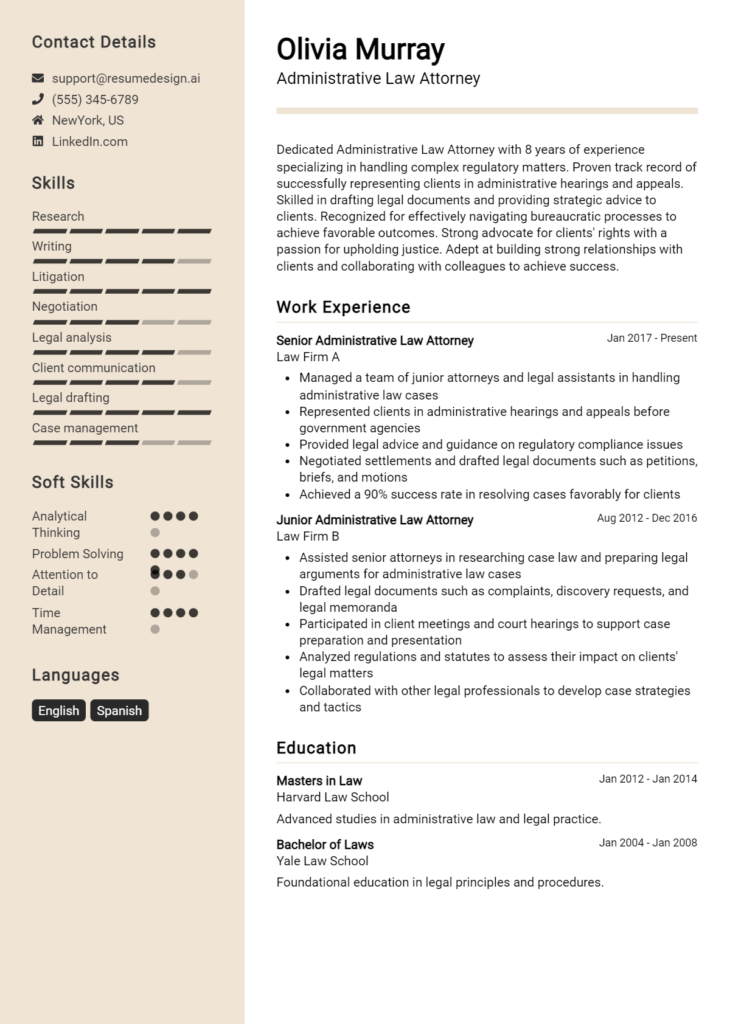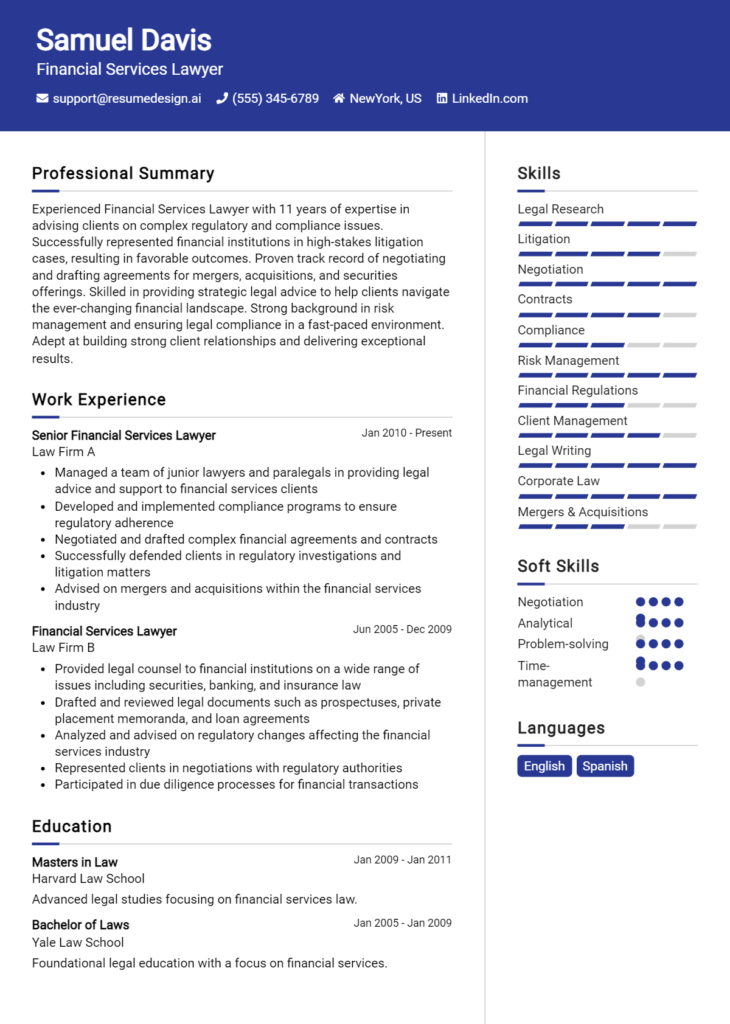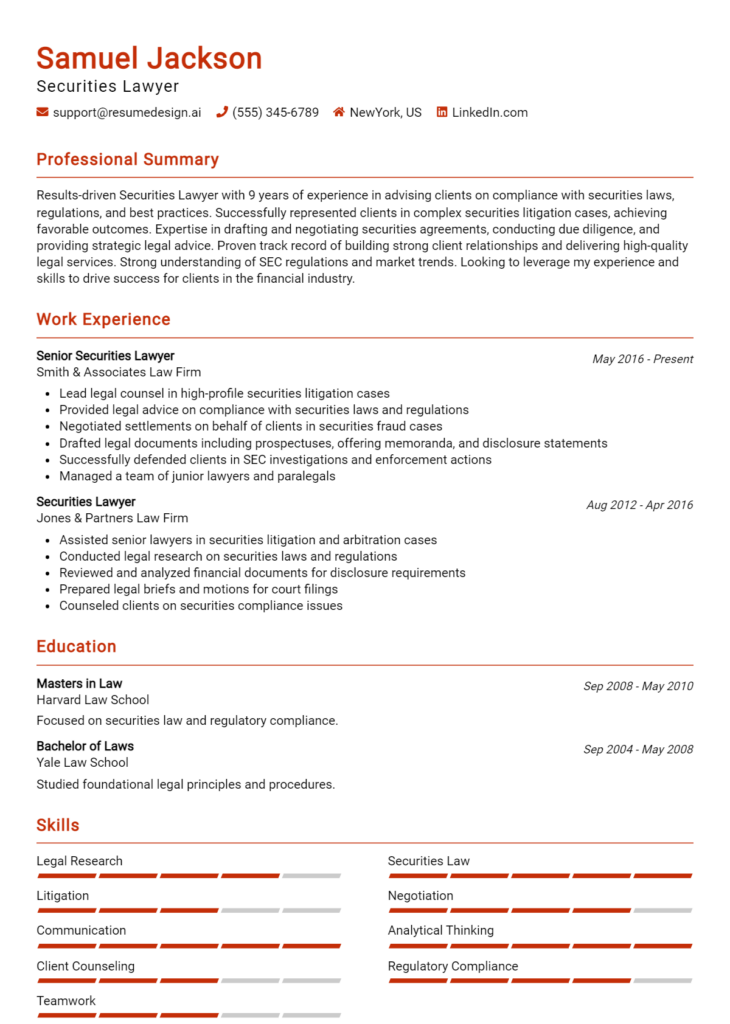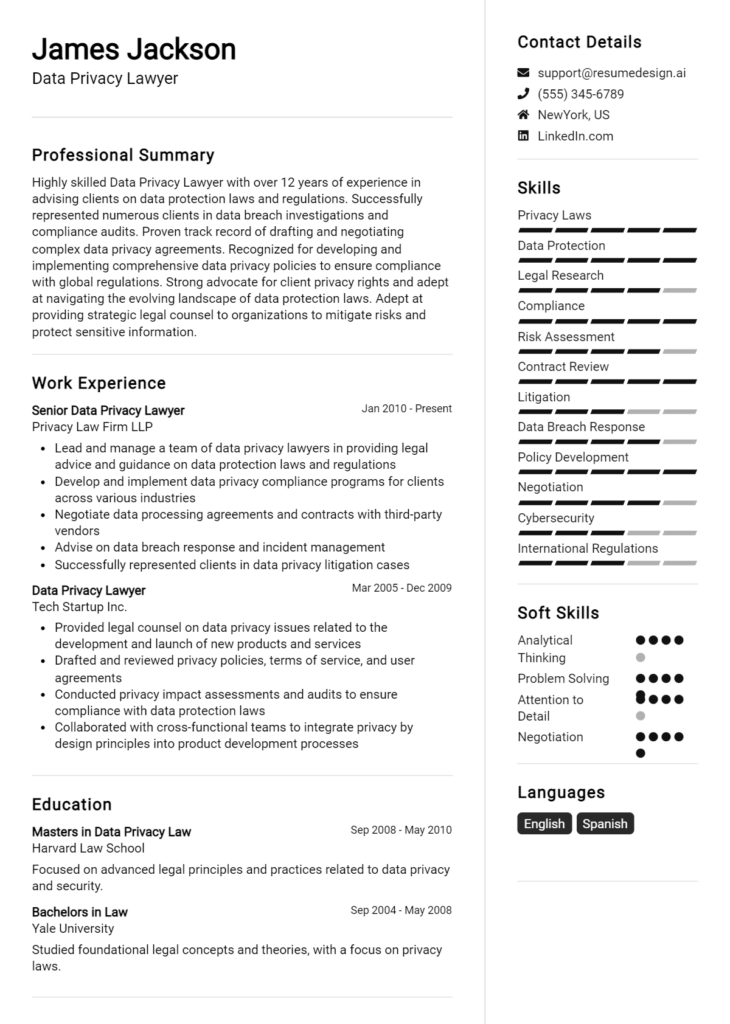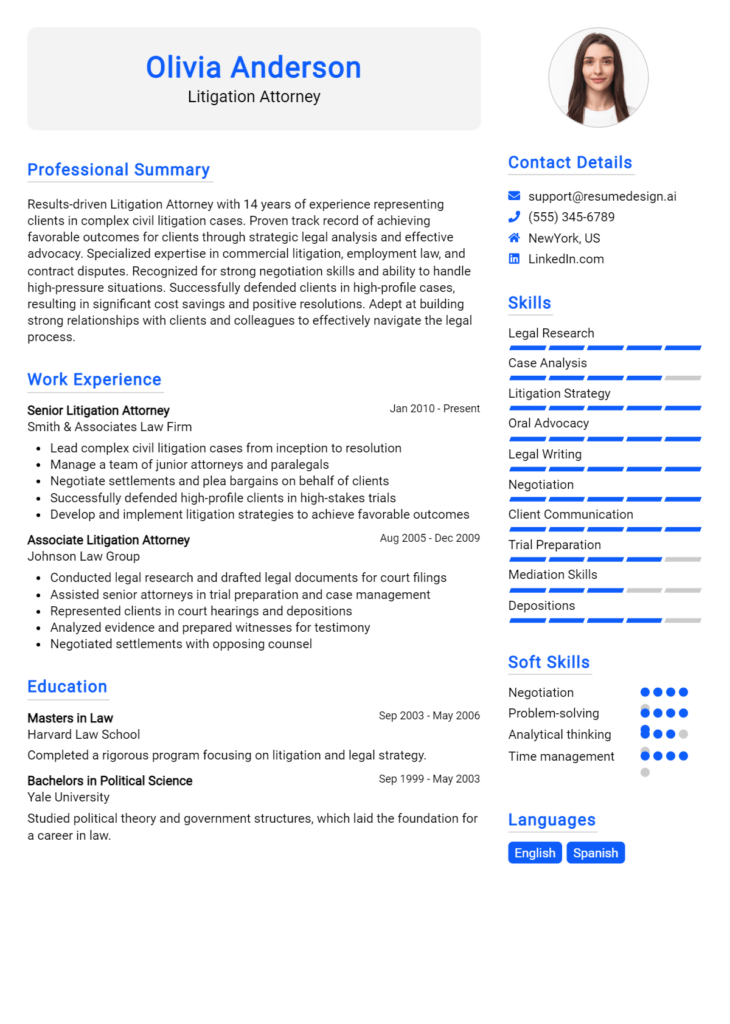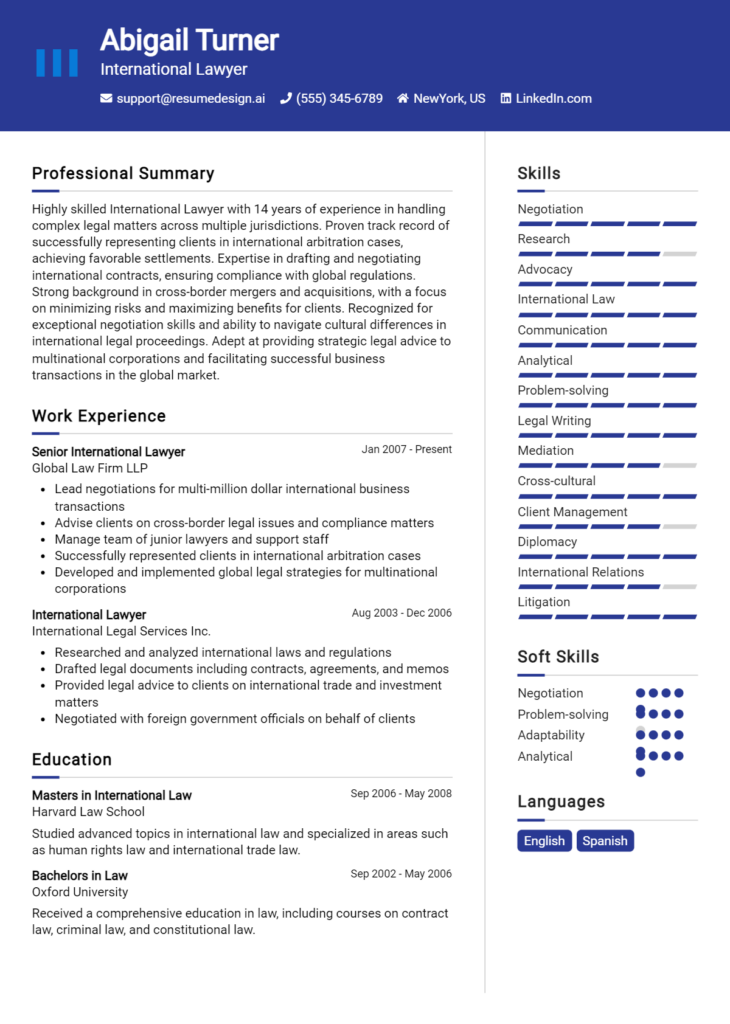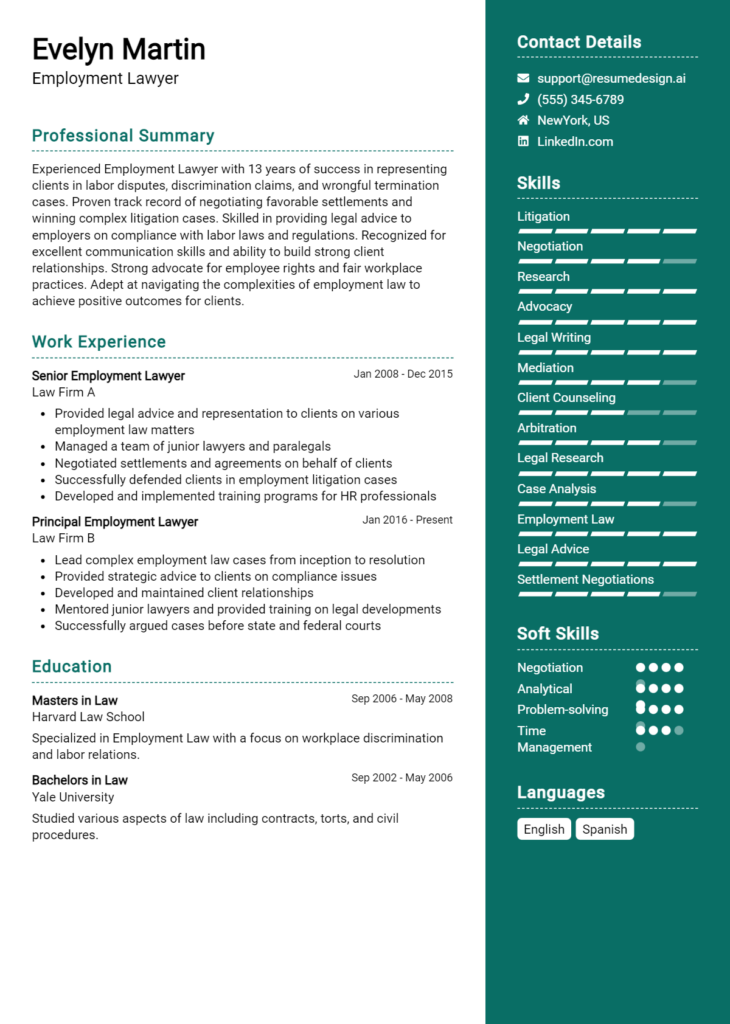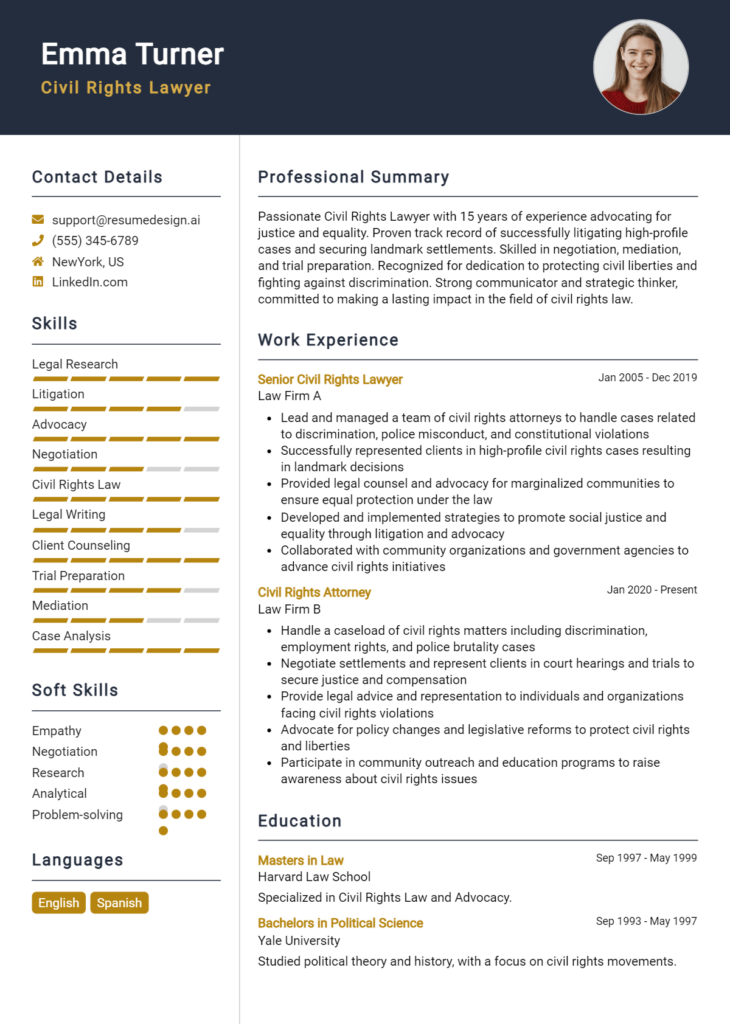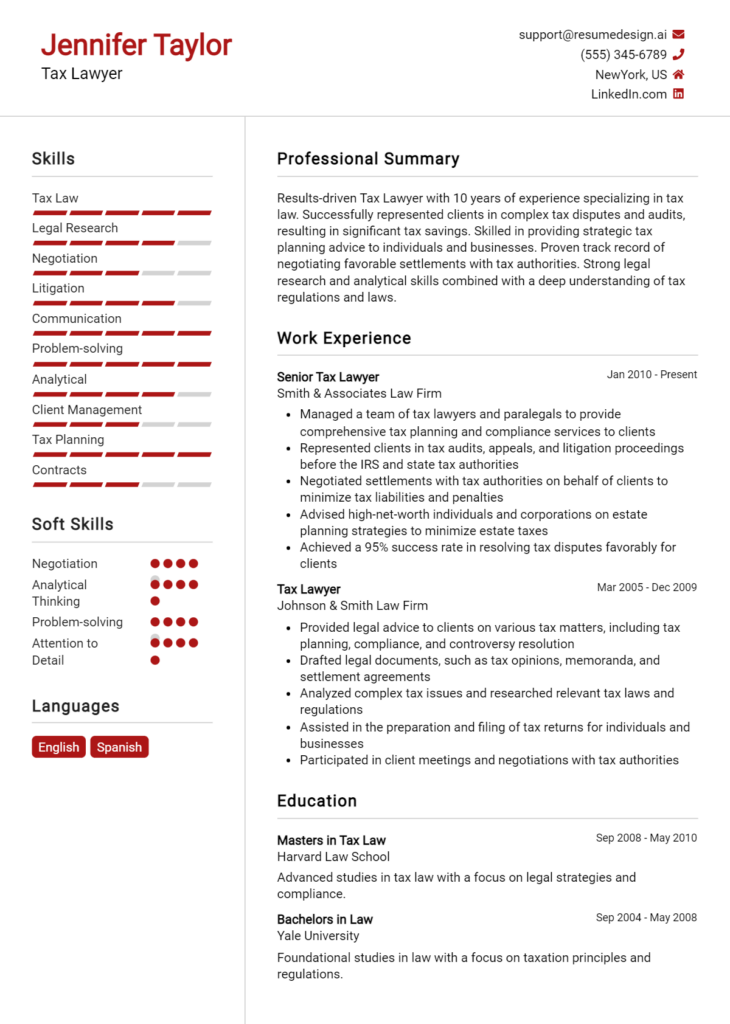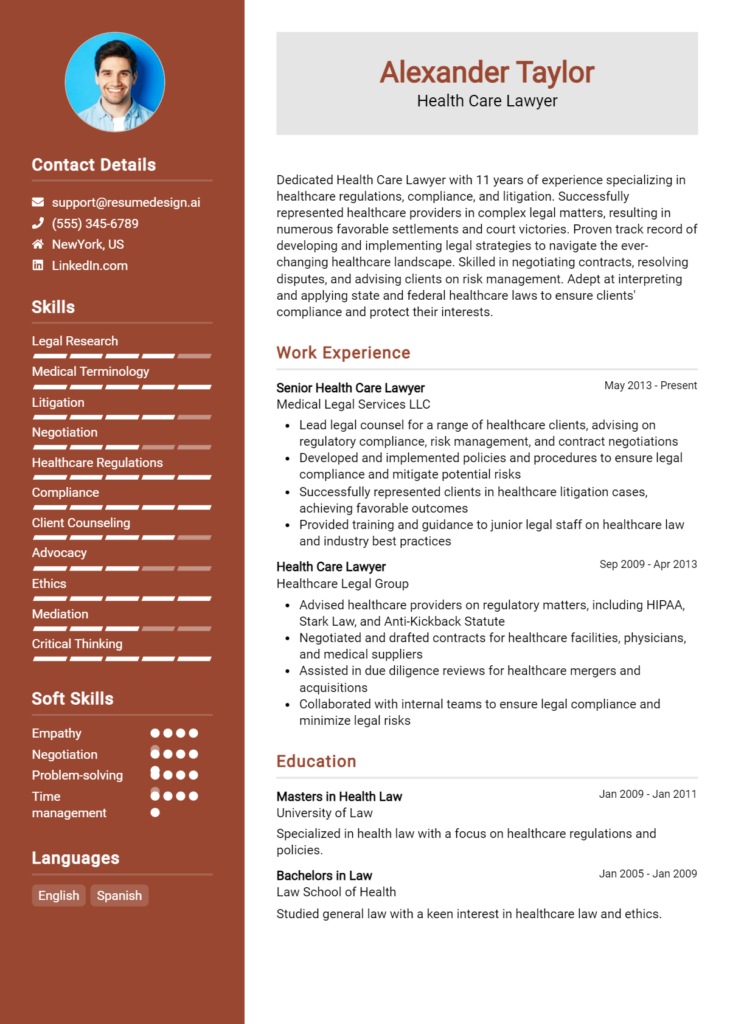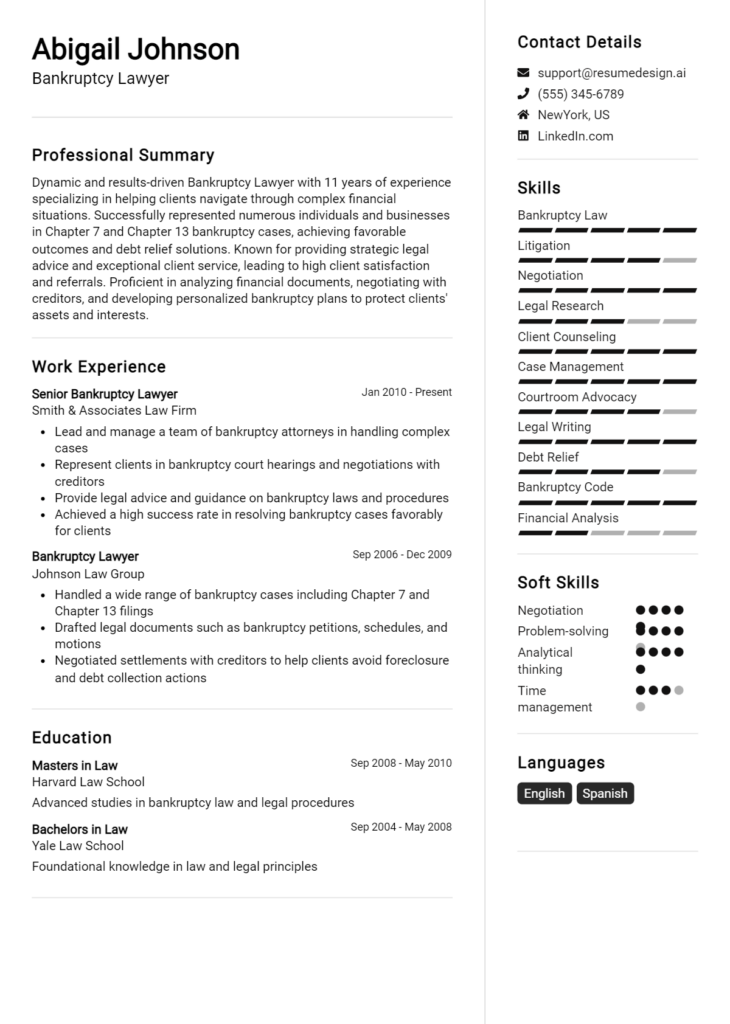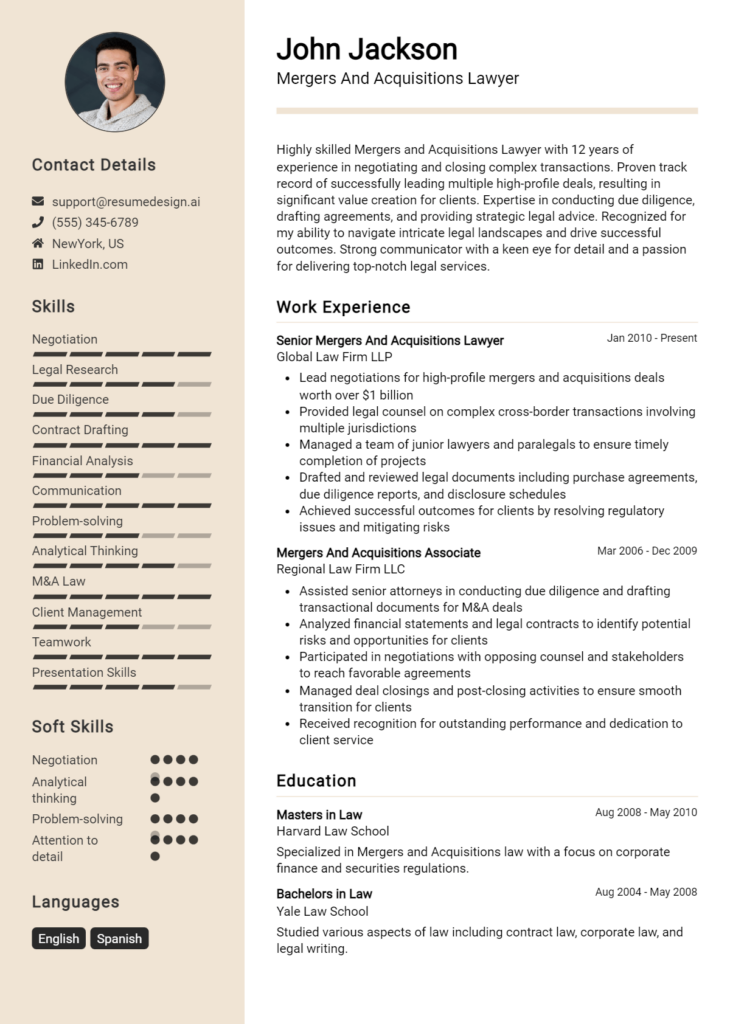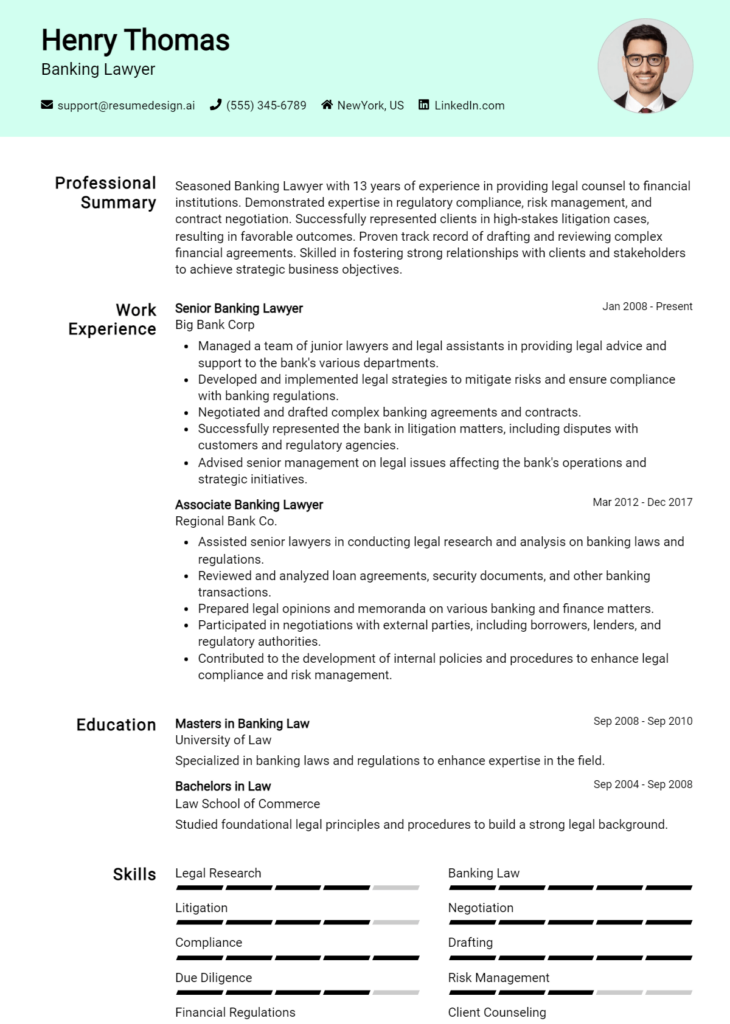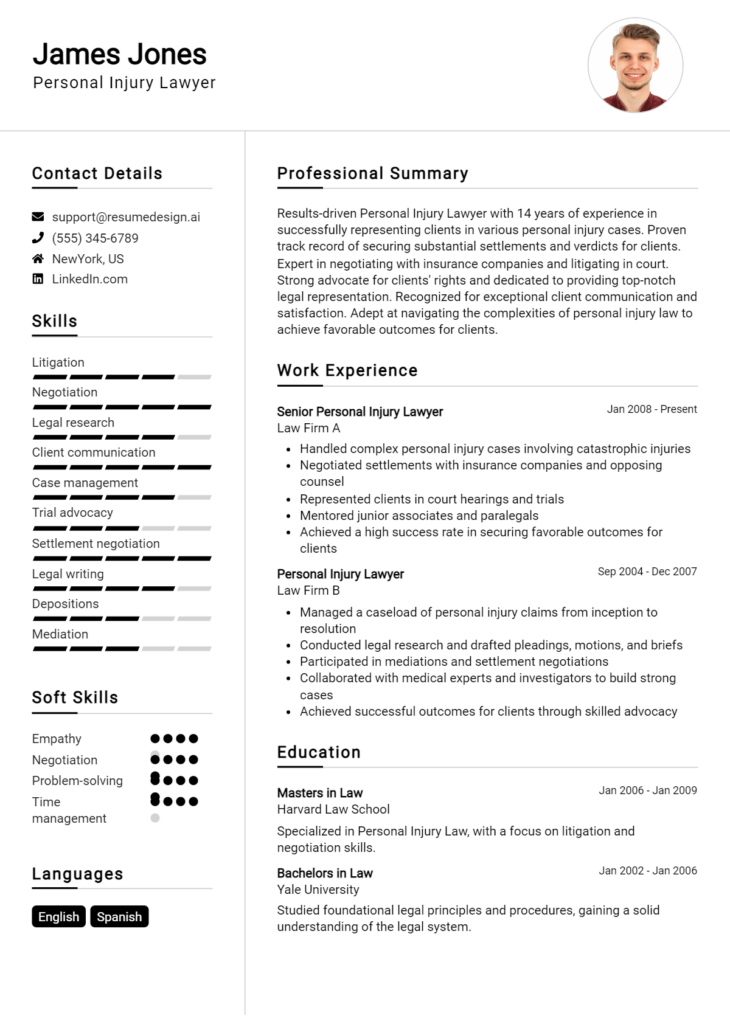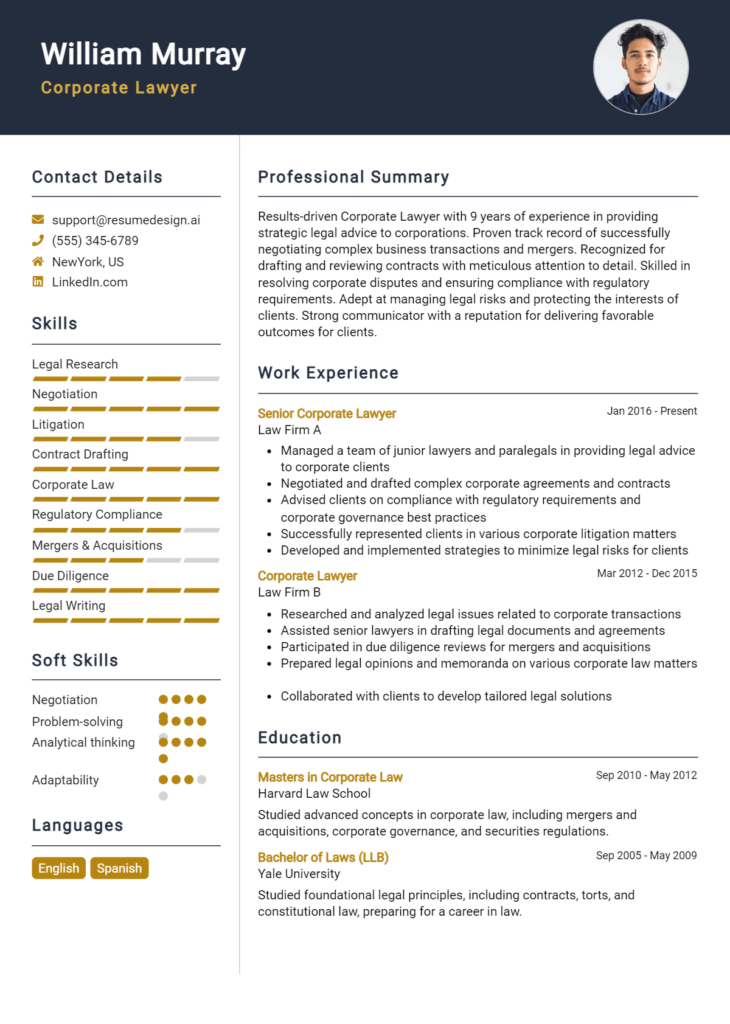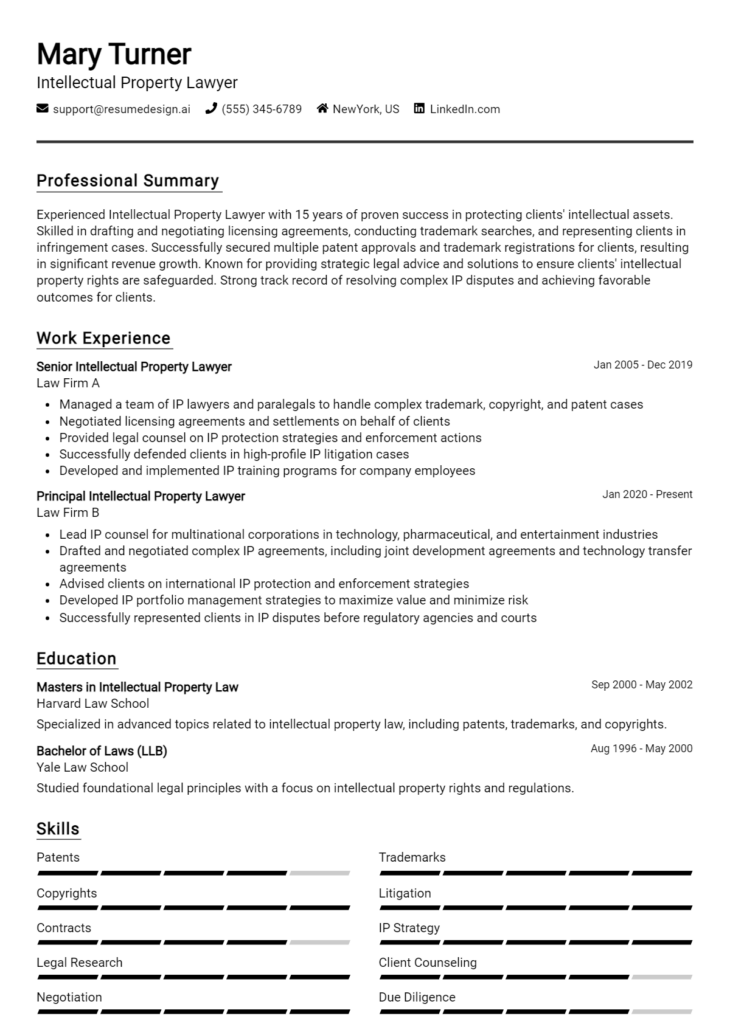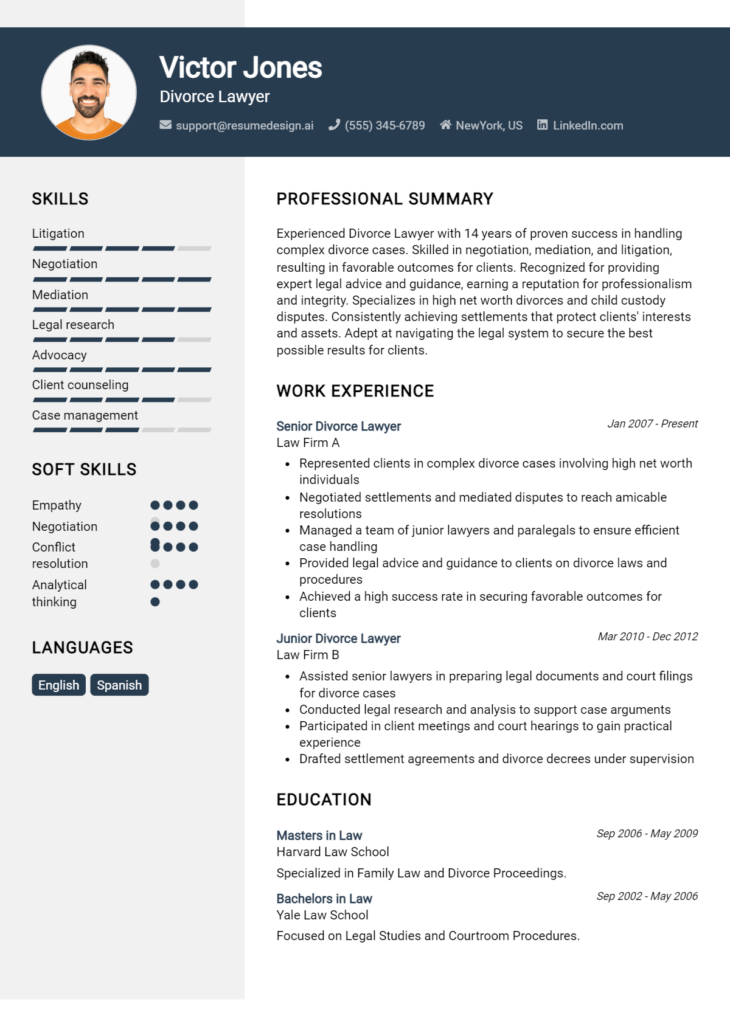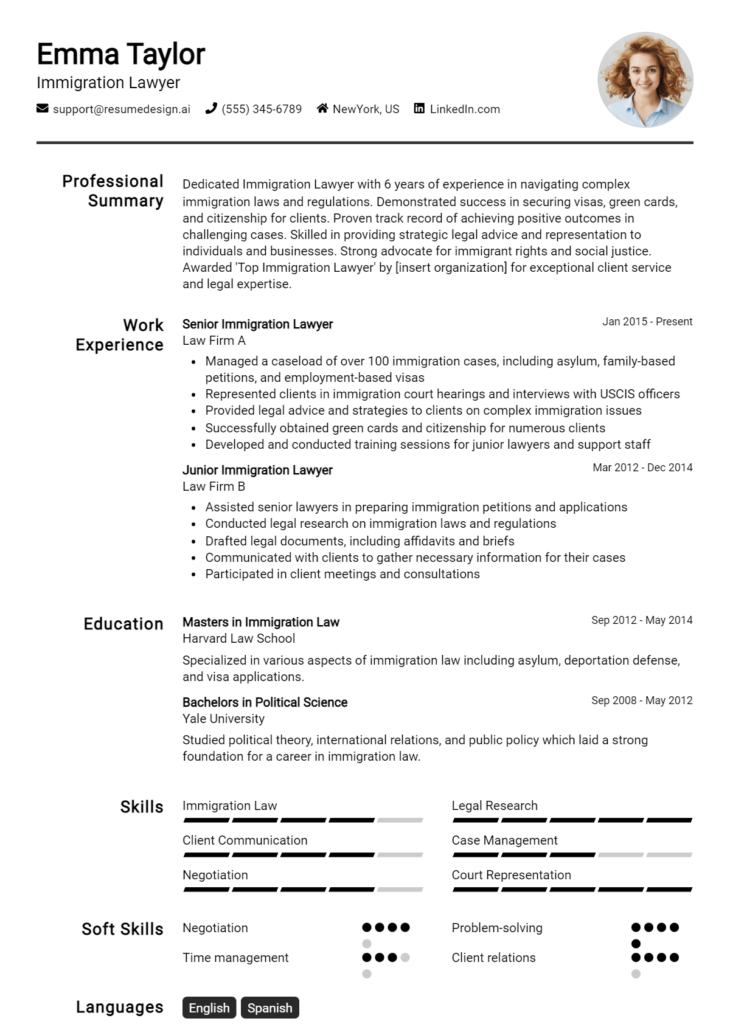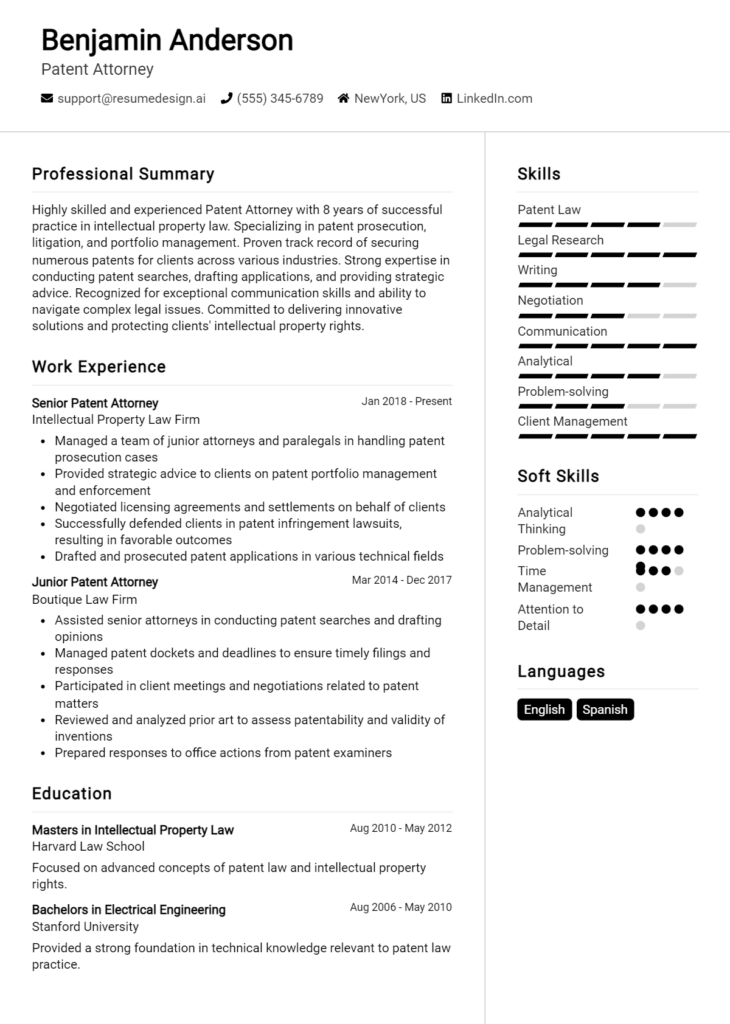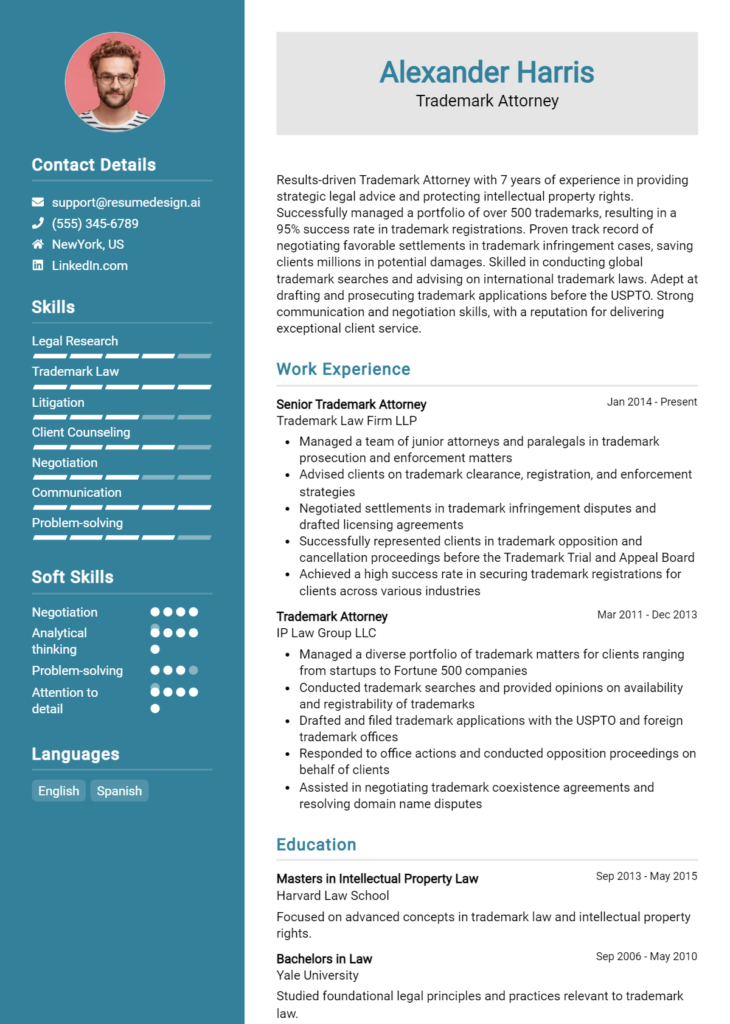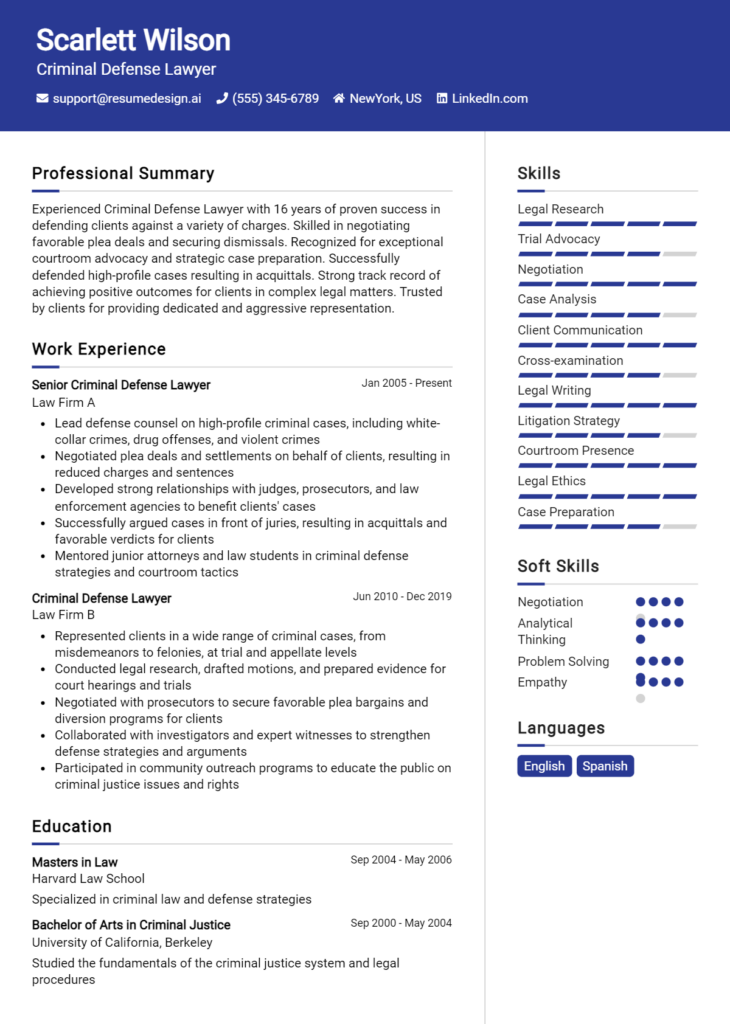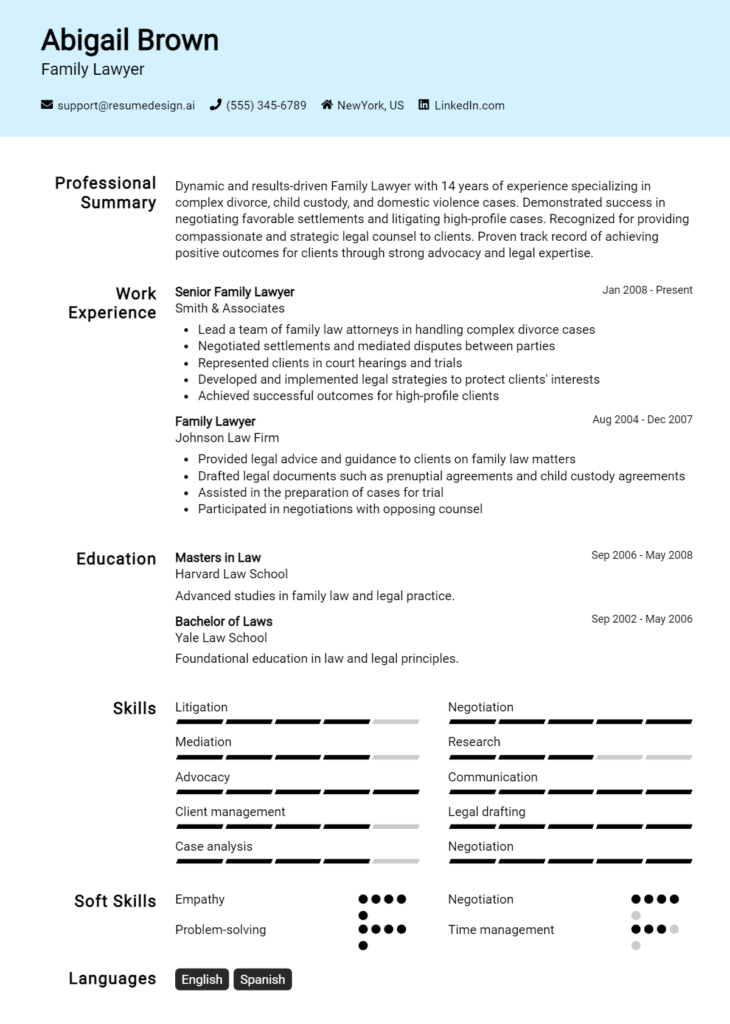Real Estate Lawyer Core Responsibilities
A Real Estate Lawyer plays a crucial role in navigating the complexities of property transactions, ensuring compliance with laws and regulations. Key responsibilities include drafting and reviewing contracts, conducting title searches, and resolving disputes. Essential skills encompass technical legal knowledge, operational efficiency, and strong problem-solving abilities, enabling seamless collaboration across departments like finance and compliance. These skills contribute significantly to the organization's goals by mitigating risks and facilitating successful transactions. A well-structured resume can effectively highlight these qualifications, showcasing the candidate's value to potential employers.
Common Responsibilities Listed on Real Estate Lawyer Resume
- Drafting and reviewing real estate contracts and agreements
- Conducting title examinations and due diligence
- Negotiating terms and conditions on behalf of clients
- Advising clients on zoning and land use regulations
- Representing clients in real estate disputes and litigation
- Ensuring compliance with local, state, and federal laws
- Facilitating property transactions and closings
- Providing legal advice on mortgage and financing options
- Researching legal precedents and case law
- Collaborating with real estate agents, developers, and lenders
- Preparing legal documentation for property transactions
- Monitoring changes in real estate laws and regulations
High-Level Resume Tips for Real Estate Lawyer Professionals
In the competitive field of real estate law, a well-crafted resume is crucial for making a strong first impression on potential employers. As the initial point of contact, your resume serves as a reflection of your professional identity, showcasing not only your legal expertise but also your unique achievements and skills relevant to the real estate industry. A thoughtfully designed resume can effectively communicate your qualifications, setting you apart from other candidates. This guide will provide practical and actionable resume tips specifically tailored for Real Estate Lawyer professionals, helping you to present your best self on paper.
Top Resume Tips for Real Estate Lawyer Professionals
- Tailor your resume to the specific job description, emphasizing the skills and experiences that align with the position.
- Showcase relevant experience in real estate transactions, litigation, or regulatory compliance, highlighting your role and contributions.
- Quantify your achievements where possible, such as the number of successful cases, transactions completed, or value of deals negotiated.
- Highlight industry-specific skills, such as knowledge of local zoning laws, property acquisition processes, and contract negotiation tactics.
- Include professional certifications or memberships in legal organizations that demonstrate your commitment to the field.
- Utilize action verbs in your descriptions to convey a sense of proactivity and effectiveness in your roles.
- Incorporate keywords from the job posting to optimize your resume for applicant tracking systems (ATS).
- Maintain a clean and professional layout that enhances readability and allows key information to stand out.
- Consider adding a summary statement at the top of your resume that encapsulates your experience and career goals in real estate law.
By implementing these tips, you can significantly increase your chances of landing a job in the Real Estate Lawyer field. A polished and targeted resume not only showcases your qualifications but also demonstrates your understanding of the real estate law landscape, making you a more attractive candidate to prospective employers.
Why Resume Headlines & Titles are Important for Real Estate Lawyer
In the competitive field of real estate law, a strong resume headline or title is crucial for capturing the attention of hiring managers. A well-crafted headline serves as the first impression, summarizing a candidate's key qualifications and areas of expertise in a concise and impactful manner. It should be relevant to the role being applied for, drawing on specific skills and experiences that align with the needs of potential employers. A compelling headline can set the tone for the entire resume, making it more likely that candidates will be remembered and considered for interviews.
Best Practices for Crafting Resume Headlines for Real Estate Lawyer
- Keep it concise: Aim for one impactful phrase that communicates your value.
- Be role-specific: Tailor the headline to reflect the specific position you are applying for.
- Highlight key strengths: Focus on your most relevant skills and experiences.
- Use industry keywords: Incorporate terms that are commonly recognized in real estate law.
- Avoid jargon: Ensure your headline is easily understood by a broad audience.
- Showcase achievements: If possible, include quantifiable results or accomplishments in your headline.
- Maintain professionalism: Keep the tone formal and suitable for a legal context.
- Revise and refine: Don’t hesitate to tweak your headline to better fit different applications.
Example Resume Headlines for Real Estate Lawyer
Strong Resume Headlines
"Experienced Real Estate Lawyer Specializing in Commercial Transactions and Property Development"
“Results-Driven Real Estate Attorney with 10 Years of Experience in Litigation and Negotiation”
“Expert in Real Estate Law: Proven Track Record of Successful Closings and Client Satisfaction”
Weak Resume Headlines
“Lawyer Looking for Work”
“Experienced Professional”
The strong headlines are effective because they provide specific insights into the candidate's qualifications and areas of expertise, immediately demonstrating their value to potential employers. They incorporate relevant industry terms and highlight achievements, which can resonate with hiring managers. In contrast, the weak headlines fail to impress due to their vagueness and lack of specificity. They do not convey any unique qualifications or areas of focus, making it difficult for employers to see how the candidate fits the role.
Writing an Exceptional Real Estate Lawyer Resume Summary
A well-crafted resume summary is crucial for a Real Estate Lawyer, as it serves as the first impression a hiring manager receives. This concise introductory paragraph quickly captures attention by showcasing key skills, relevant experience, and notable accomplishments that align with the specific job role. An effective summary should be impactful and tailored to the position, allowing candidates to stand out in a competitive field and make a compelling case for their candidacy.
Best Practices for Writing a Real Estate Lawyer Resume Summary
- Quantify Achievements: Use specific numbers to highlight your success, such as the number of cases won or the percentage of favorable settlements.
- Focus on Skills: Highlight essential legal skills relevant to real estate law, including negotiation, contract drafting, and regulatory compliance.
- Tailor for the Job Description: Customize your summary to reflect the specific requirements and responsibilities outlined in the job posting.
- Keep it Concise: Aim for 3-5 sentences that convey your qualifications succinctly without unnecessary jargon.
- Use Action Verbs: Start sentences with strong action verbs to convey your proactive approach and effectiveness.
- Highlight Unique Experiences: Include specialized experiences or certifications that set you apart from other candidates.
- Showcase Soft Skills: Mention interpersonal skills such as communication and negotiation that are crucial for client interactions.
- Maintain Professional Tone: Ensure your language is formal and reflects your professionalism as a legal expert.
Example Real Estate Lawyer Resume Summaries
Strong Resume Summaries
Dynamic Real Estate Lawyer with over 8 years of experience in transactional law, specializing in commercial real estate. Successfully negotiated and closed over $150 million in property acquisitions, ensuring compliance with local regulations and minimizing risks for clients.
Detail-oriented Real Estate Attorney with a proven track record of winning 95% of cases related to property disputes. Expertise in drafting complex lease agreements and managing property transactions, resulting in a 40% increase in client satisfaction ratings.
Results-driven Real Estate Lawyer with extensive experience in zoning law and land use regulations. Spearheaded initiatives that secured permits for over 20 development projects, contributing to a 30% increase in local business growth.
Weak Resume Summaries
Experienced lawyer with a focus on real estate matters. Good at dealing with clients and paperwork.
Real Estate Lawyer with several years in the field. Capable of handling various legal tasks and providing legal advice.
The strong summaries are considered effective because they provide specific details about accomplishments, quantify results, and highlight relevant skills tailored to the role of a Real Estate Lawyer. In contrast, the weak summaries are vague, lack measurable outcomes, and fail to convey the candidate's unique qualifications or achievements, making them less impactful and memorable to hiring managers.
Work Experience Section for Real Estate Lawyer Resume
The work experience section of a Real Estate Lawyer's resume is critical as it provides prospective employers with insight into the candidate's technical skills and practical experience in the field. This section not only showcases the candidate's ability to manage diverse teams and projects effectively but also highlights their capability to deliver high-quality legal products tailored to real estate transactions. Quantifying achievements—such as the value of transactions handled or the number of cases successfully resolved—and aligning past experiences with industry standards is crucial to demonstrating the candidate's expertise and fit for the role.
Best Practices for Real Estate Lawyer Work Experience
- Clearly articulate your role in each transaction or case, specifying your responsibilities and contributions.
- Use metrics to quantify your achievements, such as the dollar amount of real estate transactions or the percentage of successful outcomes.
- Highlight specific legal skills relevant to real estate law, such as contract negotiation, zoning issues, or property litigation.
- Emphasize your experience working collaboratively with other professionals, including real estate agents, developers, and clients.
- Include details about your leadership roles in team settings or projects that demonstrate your ability to manage people effectively.
- Tailor your work experience to align with the job description, using industry terminology and relevant keywords.
- Showcase your continuous professional development, such as certifications or training related to real estate law.
- Provide context for your achievements, explaining the challenges faced and how your actions led to successful outcomes.
Example Work Experiences for Real Estate Lawyer
Strong Experiences
- Successfully negotiated and closed over $50 million in commercial real estate transactions, resulting in a 30% increase in client satisfaction ratings.
- Led a team of 5 attorneys in a landmark zoning case that resulted in the approval of a $10 million development project, enhancing community engagement and support.
- Managed a portfolio of over 200 residential properties, ensuring compliance with local regulations and reducing litigation risks by 40% through proactive legal strategies.
- Developed and implemented training programs for junior associates, improving legal research efficiency by 25% and enhancing overall team performance.
Weak Experiences
- Worked on various real estate cases without specifying any outcomes or contributions.
- Assisted in real estate transactions; however, no details about the scope or results were provided.
- Reviewed contracts and documents without mentioning the volume or complexity of the work.
- Participated in team meetings related to real estate law without outlining specific contributions or leadership roles.
The examples of strong experiences are considered effective because they provide specific, quantifiable outcomes that clearly demonstrate the candidate's technical expertise and leadership capabilities. They highlight measurable success and collaboration, making the candidate stand out. Conversely, the weak experiences lack detail and quantifiable results, making it difficult for potential employers to assess the candidate's true impact and skills in the real estate legal field.
Education and Certifications Section for Real Estate Lawyer Resume
The education and certifications section of a Real Estate Lawyer's resume plays a crucial role in establishing the candidate's qualifications and expertise in the field. This section not only showcases the academic achievements that form the foundation of a legal career but also highlights industry-relevant certifications and continuous learning efforts that reflect the candidate's commitment to professional development. By providing detailed information on relevant coursework, specialized training, and recognized credentials, candidates can significantly enhance their credibility and demonstrate their alignment with the requirements of the job role.
Best Practices for Real Estate Lawyer Education and Certifications
- Include degrees from accredited law schools and universities, emphasizing your Juris Doctor (JD) and any relevant undergraduate degrees.
- Highlight industry-recognized certifications, such as the Certified Commercial Investment Member (CCIM) or the National Association of Realtors (NAR) designations.
- Detail relevant coursework that pertains to real estate law, property transactions, and land use regulations.
- Showcase any specialized training or continuing education courses that focus on emerging trends in real estate law.
- List memberships in professional organizations, such as the American Bar Association's Real Property, Trust and Estate Law Section.
- Provide clear dates for your educational achievements and certifications to reflect your ongoing commitment to learning.
- Use a clean and professional format that makes the information easy to read and understand.
- Tailor your education and certifications section to align with the specific requirements of the job you are applying for.
Example Education and Certifications for Real Estate Lawyer
Strong Examples
- Juris Doctor (JD), University of California, Berkeley School of Law, 2015
- Certified Commercial Investment Member (CCIM), 2021
- Courses in Real Estate Transactions, Property Law, and Land Use Planning
- Continuing Education: Advanced Real Estate Law Workshop, 2022
Weak Examples
- Bachelor of Arts in History, University of Texas, 2010 (not directly relevant)
- Certification in General Business Management, 2018 (not applicable to real estate law)
- Courses in English Literature and Creative Writing (not relevant to legal practice)
- Outdated certification in Real Estate Salesperson, 2010 (no longer relevant)
The examples provided illustrate a clear distinction between strong and weak qualifications. Strong examples are closely aligned with the specific requirements of a Real Estate Lawyer, showcasing degrees and certifications that are directly relevant to the field. In contrast, weak examples include degrees and certifications that do not pertain to real estate law, demonstrating a lack of focus and relevance that can detract from a candidate's overall appeal. By carefully curating this section, candidates can effectively communicate their qualifications and commitment to the real estate legal profession.
Top Skills & Keywords for Real Estate Lawyer Resume
In the competitive field of real estate law, a well-crafted resume that highlights essential skills can significantly enhance a candidate's prospects. Employers seek lawyers who not only possess a deep understanding of legal principles but also exhibit a range of soft and hard skills that enable them to navigate complex transactions and provide exceptional client service. By showcasing these skills, a real estate lawyer can demonstrate their ability to effectively manage cases, communicate with clients, and adapt to the ever-evolving landscape of real estate law. Incorporating relevant skills into a resume is crucial for standing out in a crowded job market.
Top Hard & Soft Skills for Real Estate Lawyer
Soft Skills
- Strong communication skills
- Negotiation abilities
- Problem-solving mindset
- Attention to detail
- Client-focused approach
- Time management
- Adaptability
- Team collaboration
- Critical thinking
- Emotional intelligence
- Conflict resolution
- Research proficiency
- Leadership capabilities
- Ethical judgment
Hard Skills
- Knowledge of real estate laws and regulations
- Proficiency in contract drafting and review
- Experience with title searches and property deeds
- Familiarity with zoning and land use regulations
- Understanding of lease agreements and transactions
- Competence in dispute resolution and litigation
- Ability to conduct due diligence
- Proficient in real estate appraisal and valuation
- Knowledge of mortgage financing and loan processes
- Familiarity with real estate development and investment strategies
- Legal research skills
- Experience with transactional real estate
- Proficiency in using legal software and databases
- Understanding of environmental regulations and compliance
By emphasizing both soft and hard skills in their resumes, real estate lawyers can effectively convey their qualifications and readiness to tackle the challenges of the role. Moreover, integrating relevant work experience alongside these skills further strengthens their application, showcasing practical applications of their expertise.
Stand Out with a Winning Real Estate Lawyer Cover Letter
I am writing to express my interest in the Real Estate Lawyer position at [Company Name], as advertised on [Platform/Website]. With over [X years] of experience in real estate law, I have developed a robust understanding of property transactions, zoning laws, and regulatory compliance. My background includes representing clients in a variety of real estate matters, from residential purchases to complex commercial agreements. I am confident that my expertise and dedication to providing exceptional legal counsel will make a valuable contribution to your team.
Throughout my career, I have successfully navigated high-stakes negotiations, ensuring that my clients' interests are protected while fostering positive relationships with all parties involved. My ability to analyze contracts, draft legal documents, and conduct thorough due diligence has consistently resulted in favorable outcomes for my clients. I am adept at identifying potential legal challenges early on and providing strategic advice to mitigate risks. Furthermore, my strong communication skills allow me to explain complex legal concepts clearly and effectively to clients, ensuring they are well-informed and confident in their decisions.
At [Previous Employer/Organization], I played a key role in several significant real estate transactions, including [specific project or deal]. I collaborated closely with real estate agents, developers, and financial institutions to facilitate seamless transactions while adhering to all legal requirements. I have also been actively involved in community outreach initiatives, helping to educate prospective homeowners about their rights and responsibilities under the law. This experience has strengthened my commitment to serving clients with integrity and professionalism.
I am excited about the opportunity to bring my skills and passion for real estate law to [Company Name]. I believe that my proactive approach and commitment to client satisfaction align perfectly with your firm's values. I look forward to the possibility of discussing how my background, skills, and enthusiasm can contribute to the continued success of your practice. Thank you for considering my application.
Common Mistakes to Avoid in a Real Estate Lawyer Resume
When applying for a position as a Real Estate Lawyer, crafting a polished and professional resume is essential to make a strong first impression. However, many candidates often fall into common pitfalls that can hinder their chances of landing an interview. To help you present your qualifications effectively, here are some mistakes to avoid when creating your real estate lawyer resume:
Ignoring Specific Keywords: Many resumes fail to include industry-specific keywords that employers look for. Tailoring your resume to incorporate these terms can improve your chances of passing through Applicant Tracking Systems (ATS).
Overly Complex Language: While legal jargon is important, using overly complex language can alienate readers. Aim for clarity and conciseness to ensure your qualifications are easily understood.
Lack of Quantifiable Achievements: Simply listing job duties does not showcase your impact. Highlight achievements with quantifiable results, such as successful transactions or cases won, to demonstrate your effectiveness.
Inconsistent Formatting: An unprofessional format can distract from your qualifications. Ensure consistent font styles, sizes, and spacing throughout your resume to maintain a polished appearance.
Neglecting Relevant Experience: Failing to prioritize relevant legal experience can make your resume less compelling. Focus on your real estate law experience and related roles that showcase your expertise.
Missing a Professional Summary: A strong resume should include a professional summary that encapsulates your skills and experiences. This section provides a snapshot of your qualifications and helps capture the attention of hiring managers.
Including Irrelevant Information: Avoid cluttering your resume with unrelated work experience or personal information. Keep it focused on your legal expertise and skills pertinent to real estate law.
Not Proofreading: Typos and grammatical errors can undermine your credibility. Always proofread your resume carefully to ensure it is free of mistakes and presents you in the best light.
Conclusion
As we explored the essential responsibilities of a Real Estate Lawyer, we highlighted the importance of expertise in property law, contract negotiation, and dispute resolution. Additionally, we discussed the need for effective communication skills and an understanding of local real estate markets to represent clients successfully.
Having a well-crafted resume is crucial for landing a position in this competitive field. It should clearly demonstrate your qualifications, experience, and skills that align with the demands of a Real Estate Lawyer role.
Now is the perfect time to review and enhance your Real Estate Lawyer resume. Utilize resources such as resume templates, which can provide a professional layout for showcasing your credentials. Consider using a resume builder to streamline the creation process and ensure your resume stands out to potential employers. Additionally, check out resume examples for inspiration and ideas on how to present your experience effectively. Don’t forget to complement your resume with a compelling cover letter template that articulates your passion for real estate law and your commitment to client success.
Take the next step in your career by refining your resume today!

